Cedegao E. Zhang
A Matter of Interest: Understanding Interestingness of Math Problems in Humans and Language Models
Nov 11, 2025Abstract:The evolution of mathematics has been guided in part by interestingness. From researchers choosing which problems to tackle next, to students deciding which ones to engage with, people's choices are often guided by judgments about how interesting or challenging problems are likely to be. As AI systems, such as LLMs, increasingly participate in mathematics with people -- whether for advanced research or education -- it becomes important to understand how well their judgments align with human ones. Our work examines this alignment through two empirical studies of human and LLM assessment of mathematical interestingness and difficulty, spanning a range of mathematical experience. We study two groups: participants from a crowdsourcing platform and International Math Olympiad competitors. We show that while many LLMs appear to broadly agree with human notions of interestingness, they mostly do not capture the distribution observed in human judgments. Moreover, most LLMs only somewhat align with why humans find certain math problems interesting, showing weak correlation with human-selected interestingness rationales. Together, our findings highlight both the promises and limitations of current LLMs in capturing human interestingness judgments for mathematical AI thought partnerships.
On the Same Wavelength? Evaluating Pragmatic Reasoning in Language Models across Broad Concepts
Sep 08, 2025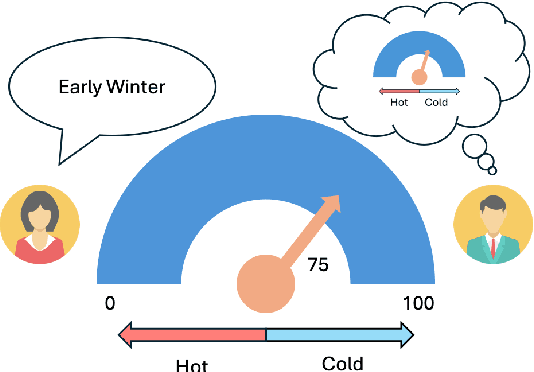



Abstract:Language use is shaped by pragmatics -- i.e., reasoning about communicative goals and norms in context. As language models (LMs) are increasingly used as conversational agents, it becomes ever more important to understand their pragmatic reasoning abilities. We propose an evaluation framework derived from Wavelength, a popular communication game where a speaker and a listener communicate about a broad range of concepts in a granular manner. We study a range of LMs on both language comprehension and language production using direct and Chain-of-Thought (CoT) prompting, and further explore a Rational Speech Act (RSA) approach to incorporating Bayesian pragmatic reasoning into LM inference. We find that state-of-the-art LMs, but not smaller ones, achieve strong performance on language comprehension, obtaining similar-to-human accuracy and exhibiting high correlations with human judgments even without CoT prompting or RSA. On language production, CoT can outperform direct prompting, and using RSA provides significant improvements over both approaches. Our study helps identify the strengths and limitations in LMs' pragmatic reasoning abilities and demonstrates the potential for improving them with RSA, opening up future avenues for understanding conceptual representation, language understanding, and social reasoning in LMs and humans.
Scaling up the think-aloud method
May 29, 2025Abstract:The think-aloud method, where participants voice their thoughts as they solve a task, is a valuable source of rich data about human reasoning processes. Yet, it has declined in popularity in contemporary cognitive science, largely because labor-intensive transcription and annotation preclude large sample sizes. Here, we develop methods to automate the transcription and annotation of verbal reports of reasoning using natural language processing tools, allowing for large-scale analysis of think-aloud data. In our study, 640 participants thought aloud while playing the Game of 24, a mathematical reasoning task. We automatically transcribed the recordings and coded the transcripts as search graphs, finding moderate inter-rater reliability with humans. We analyze these graphs and characterize consistency and variation in human reasoning traces. Our work demonstrates the value of think-aloud data at scale and serves as a proof of concept for the automated analysis of verbal reports.
Building Machines that Learn and Think with People
Jul 22, 2024
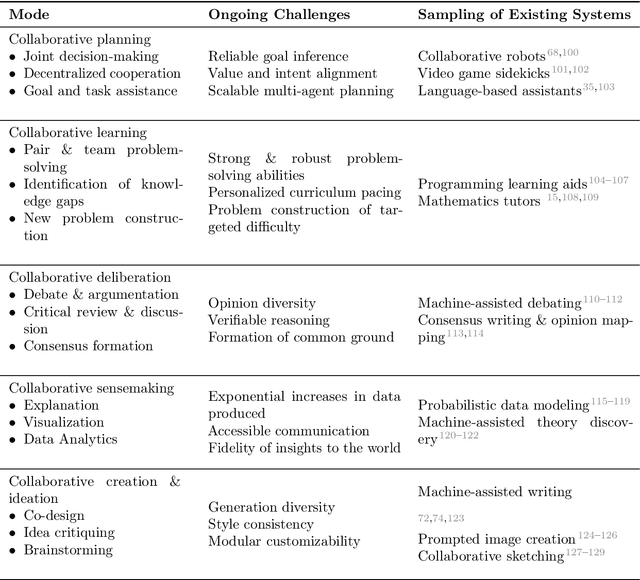
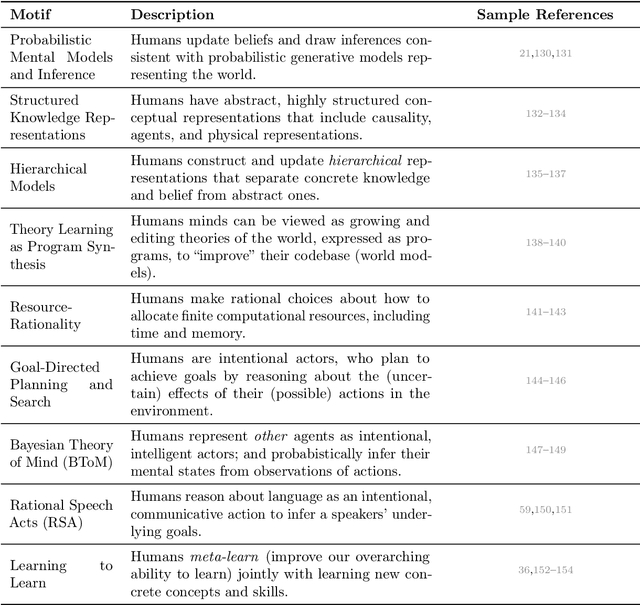
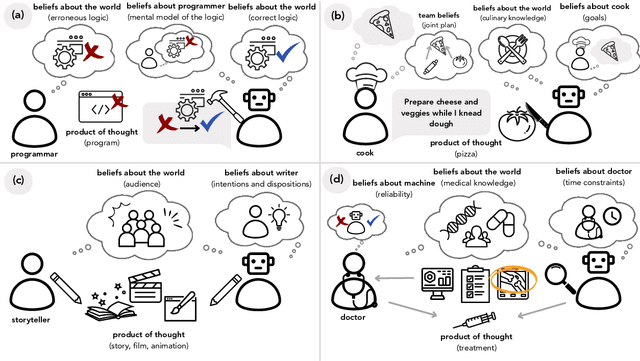
Abstract:What do we want from machine intelligence? We envision machines that are not just tools for thought, but partners in thought: reasonable, insightful, knowledgeable, reliable, and trustworthy systems that think with us. Current artificial intelligence (AI) systems satisfy some of these criteria, some of the time. In this Perspective, we show how the science of collaborative cognition can be put to work to engineer systems that really can be called ``thought partners,'' systems built to meet our expectations and complement our limitations. We lay out several modes of collaborative thought in which humans and AI thought partners can engage and propose desiderata for human-compatible thought partnerships. Drawing on motifs from computational cognitive science, we motivate an alternative scaling path for the design of thought partners and ecosystems around their use through a Bayesian lens, whereby the partners we construct actively build and reason over models of the human and world.
People use fast, goal-directed simulation to reason about novel games
Jul 19, 2024Abstract:We can evaluate features of problems and their potential solutions well before we can effectively solve them. When considering a game we have never played, for instance, we might infer whether it is likely to be challenging, fair, or fun simply from hearing the game rules, prior to deciding whether to invest time in learning the game or trying to play it well. Many studies of game play have focused on optimality and expertise, characterizing how people and computational models play based on moderate to extensive search and after playing a game dozens (if not thousands or millions) of times. Here, we study how people reason about a range of simple but novel connect-n style board games. We ask people to judge how fair and how fun the games are from very little experience: just thinking about the game for a minute or so, before they have ever actually played with anyone else, and we propose a resource-limited model that captures their judgments using only a small number of partial game simulations and almost no lookahead search.
LINC: A Neurosymbolic Approach for Logical Reasoning by Combining Language Models with First-Order Logic Provers
Oct 23, 2023



Abstract:Logical reasoning, i.e., deductively inferring the truth value of a conclusion from a set of premises, is an important task for artificial intelligence with wide potential impacts on science, mathematics, and society. While many prompting-based strategies have been proposed to enable Large Language Models (LLMs) to do such reasoning more effectively, they still appear unsatisfactory, often failing in subtle and unpredictable ways. In this work, we investigate the validity of instead reformulating such tasks as modular neurosymbolic programming, which we call LINC: Logical Inference via Neurosymbolic Computation. In LINC, the LLM acts as a semantic parser, translating premises and conclusions from natural language to expressions in first-order logic. These expressions are then offloaded to an external theorem prover, which symbolically performs deductive inference. Leveraging this approach, we observe significant performance gains on FOLIO and a balanced subset of ProofWriter for three different models in nearly all experimental conditions we evaluate. On ProofWriter, augmenting the comparatively small open-source StarCoder+ (15.5B parameters) with LINC even outperforms GPT-3.5 and GPT-4 with Chain-of-Thought (CoT) prompting by an absolute 38% and 10%, respectively. When used with GPT-4, LINC scores 26% higher than CoT on ProofWriter while performing comparatively on FOLIO. Further analysis reveals that although both methods on average succeed roughly equally often on this dataset, they exhibit distinct and complementary failure modes. We thus provide promising evidence for how logical reasoning over natural language can be tackled through jointly leveraging LLMs alongside symbolic provers. All corresponding code is publicly available at https://github.com/benlipkin/linc
AI for Mathematics: A Cognitive Science Perspective
Oct 19, 2023Abstract:Mathematics is one of the most powerful conceptual systems developed and used by the human species. Dreams of automated mathematicians have a storied history in artificial intelligence (AI). Rapid progress in AI, particularly propelled by advances in large language models (LLMs), has sparked renewed, widespread interest in building such systems. In this work, we reflect on these goals from a \textit{cognitive science} perspective. We call attention to several classical and ongoing research directions from cognitive science, which we believe are valuable for AI practitioners to consider when seeking to build truly human (or superhuman)-level mathematical systems. We close with open discussions and questions that we believe necessitate a multi-disciplinary perspective -- cognitive scientists working in tandem with AI researchers and mathematicians -- as we move toward better mathematical AI systems which not only help us push the frontier of the mathematics, but also offer glimpses into how we as humans are even capable of such great cognitive feats.
The Neuro-Symbolic Inverse Planning Engine (NIPE): Modeling Probabilistic Social Inferences from Linguistic Inputs
Jun 27, 2023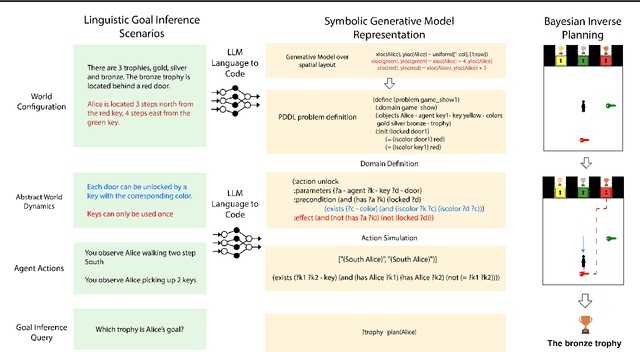
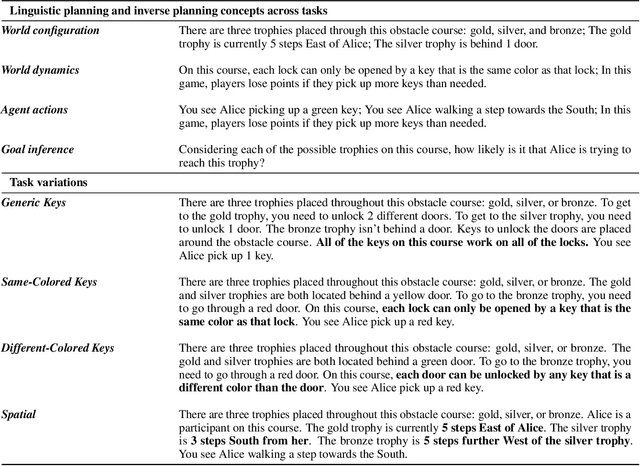

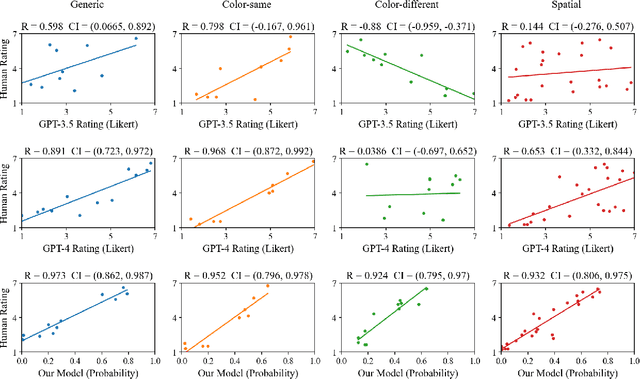
Abstract:Human beings are social creatures. We routinely reason about other agents, and a crucial component of this social reasoning is inferring people's goals as we learn about their actions. In many settings, we can perform intuitive but reliable goal inference from language descriptions of agents, actions, and the background environments. In this paper, we study this process of language driving and influencing social reasoning in a probabilistic goal inference domain. We propose a neuro-symbolic model that carries out goal inference from linguistic inputs of agent scenarios. The "neuro" part is a large language model (LLM) that translates language descriptions to code representations, and the "symbolic" part is a Bayesian inverse planning engine. To test our model, we design and run a human experiment on a linguistic goal inference task. Our model closely matches human response patterns and better predicts human judgements than using an LLM alone.
 Add to Chrome
Add to Chrome Add to Firefox
Add to Firefox Add to Edge
Add to Edge